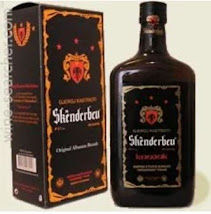Precedential No. 11: TTAB Dismisses SKËNDERBEU Brandy Opposition for Failure to Prove Priority and Fraud
This consolidated opposition proceeding featured two companies battling over rights to the same marks for Albanian brandy. Applicant ADOL sought registration of the marks SKËNDERBEU and GJERGJ KASTRIOTI SKËNDERBEU (Stylized) for "beverages from wine distillates, namely, brandy and grape brandy." Illyrian Import opposed on the grounds of fraud and likelihood of confusion with the previously used mark GJERGJ KASTRIOTI SKËNDERBEU for liquor, including brandy. The Board dismissed both claims. Illyrian Import, Inc. v. ADOL Sh.p.k., 2022 USPQ2d 292 (TTAB 2022) [precedential] (Opinion by Judge Marc A. Bergsman).
Priority: Applicant ADOL proved that it first used the subject marks in the United States in April 2004. Illyrian Import claimed to be the exclusive authorized distributor and brand agent of a company ("GKS") that continuously sold GJERGJ KASTRIOTI SKËNDERBEU and SKËNDERBEU brandy in the United States since 2002. Illyrian began distributing the products in 2016 and established a first use date of July 31, 2016 .
The Board, however, ruled that Illyrian cannot rely on the GKS's use of the marks to prove priority. See Moreno v. Pro Boxing Supplies, Inc., 124 USPQ2d 1028, 1033-34 (TTAB 2017). In Moreno, the Board held that, although exclusive licensee Julie Moreno could establish entitlement to a statutory cause of action, she could not prove priority based on use of the mark at issue by her licensor because that would "improperly recognize trademark ownership rights in a licensee." See also Chem. N.Y. Corp. v. Conmar Form Sys., Inc., 1 USPQ2d 1139, 1142 (TTAB 1986).
As in Moreno, the written agreement between Illyrian and GKS did not give Illyrian any ownership interest in the marks, but only a license permitting it to use the marks as the distributor of the brandy. The Board also pointed out that "as between a manufacturer and distributor, the manufacturer is presumed to own a trademark applied to the goods." Fuji Med. Instruments Mfg. Co. v. Am. Crocodile Int’l Grp., Inc., 2021 USPQ2d 831, at *18 (TTAB 2021).
Illyrian argued that its agreement with GKS gave it the power and authority to assert the trademark rights of GKS. The Board, however, ruled that this authorization provided only an additional basis for Illyrian to establish its entitlement to file an opposition. However, Moreno forecloses the argument that Illyrian may rely on this provision to prove priority.
Opposer argues, in essence, that as the distributor/licensee, it is entitled to rely on its supplier/licensor’s use to prove priority (i.e., that the licensor’s use inures to the benefit of the licensee) but that would be akin to claiming a transfer of ownership and there has been no such transfer between Opposer and GKS. GKS and Opposer cannot contract around the legal principle that a licensor’s use does not inure to the benefit of the licensee.
Opposer Illyrian was thus unable to prove priority, and so the Board dismissed its Section 2(d) claim.
Fraud: Illyrian alleged that ADOL committed fraud by falsely claiming ownership of the subject marks. Although the claims were not pled with the requisite particularity, ADOL did not move to dismiss the claims nor seek a more definite statement. Instead, it argued in its brief that Illyrian "failed to plead any intent to deceive on the part of Applicant, an element required to be pled with specificity." The Board concluded that since ADOL "was on notice that a fraud claim was asserted, did not request more particularity, defended against it, and argued, in its brief, that Opposer failed to prove Applicant knowingly made a false misrepresentation of fact," the fraud claim was tried by consent, and so the Board construed the pleadings to be appropriately amended.
The Board understood Illyrian's fraud claim to be that ADOL, when it filed the subject applications on August 9, 2016, knew of GKS's ownership and registration of the GJERGJ KASTRIOTI SKËNDERBEU mark in design form (cancelled in 2013) and knew that GKS had the right to use the subject marks. Thus, according to Illyrian, ADOL knew that GKS had the superior right.
The Board set forth once again the elements of a fraud claim:
Fraud in procuring or maintaining a trademark registration occurs when an applicant for registration or a registrant in a declaration of use or a renewal application knowingly makes specific false, material representations of fact with the intent of obtaining or maintaining a registration to which it is otherwise not entitled. See In re Bose Corp., 580 F.3d 1240, 91 USPQ2d 1938 (Fed. Cir. 2009).
A party claiming fraud faces a heavy burden of proof: "[T]he very nature of the charge of fraud requires that it be proven ‘to the hilt’ with clear and convincing evidence. There is no room for speculation, inference or surmise and, obviously, any doubt must be resolved against the charging party.' In re Bose Corp., 91 USPQ2d at 1939 (quoting Smith Int’l, Inc. v. Olin Corp., 209 USPQ 1033, 1044 (TTAB 1981))."
Even assuming that the relevant statements were false, the record evidence did not establish that ADOL believed or knew they were false. Therefore, the Board could not find that ADOL intended to deceive the USPTO.
[T]he legal right to use the SKËNDERBEU marks emanating from Applicant’s prior U.S. registration, as well as from the rights granted by the Albanian government, is both complex and confusing, potentially leaving Mr. Hatellari with an unclear understanding of his company’s trademark rights.
Accordingly, the Board dismissed Illyrian's fraud claim.
Read comments and post your comment here.
TTABlogger comment: Judge Bergsman deserves a snifter of cognac after sorting out the facts in this one.
Text Copyright John L. Welch 2022.






0 Comments:
Post a Comment
<< Home